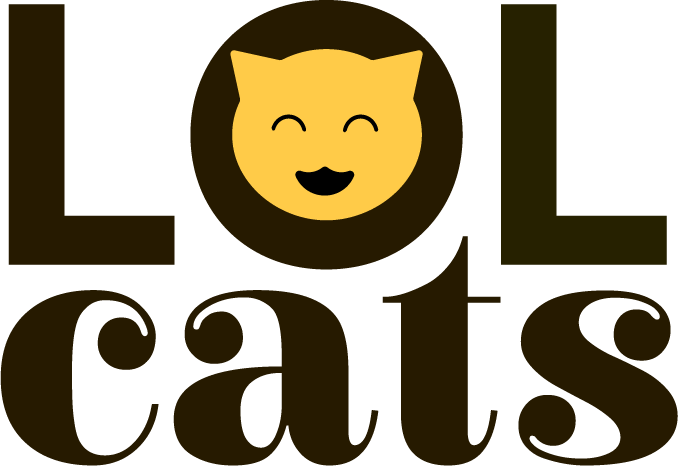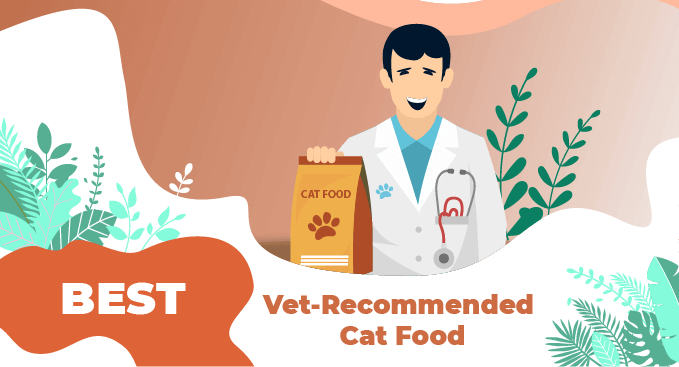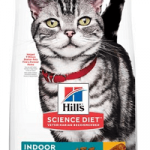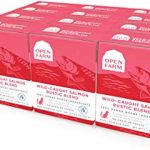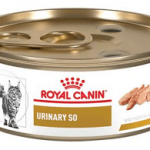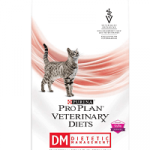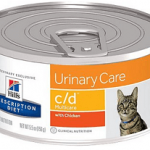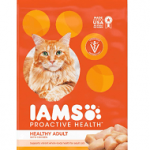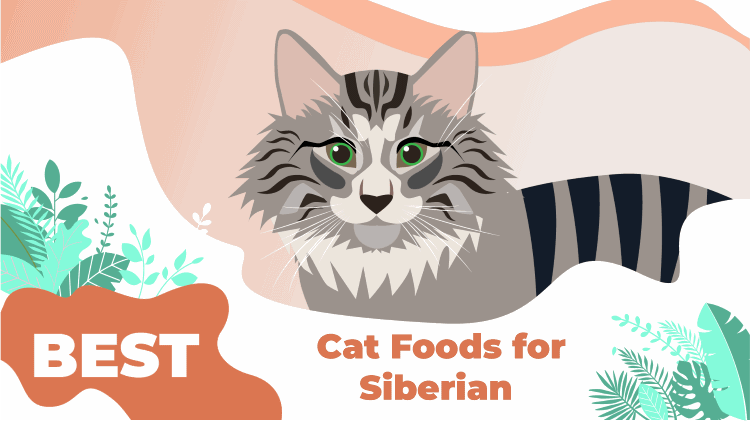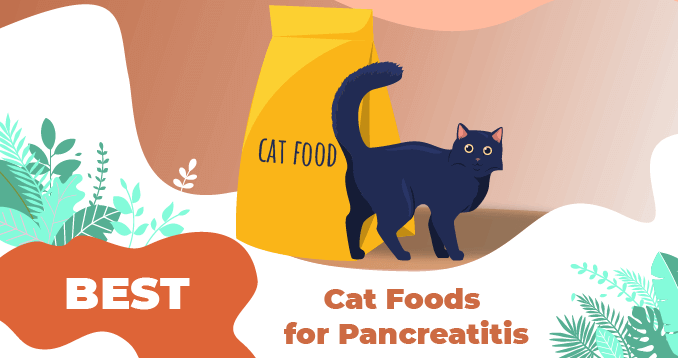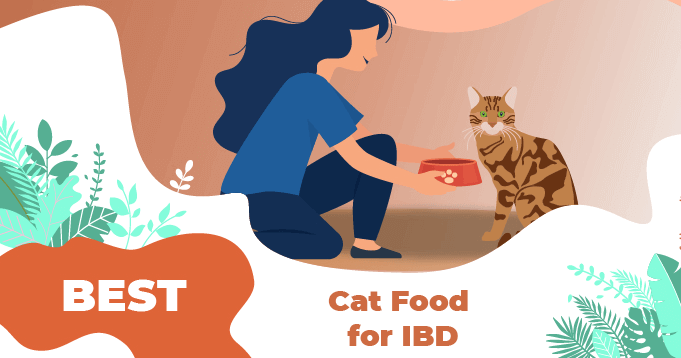The 7 Best Vet-Recommended Dry and Wet Cat Foods
This page contains affiliate links. We may earn money or products from the companies mentioned in this post through our independently chosen links, which earn us a commission.
When your cat gets sick, who do you turn to? You probably take your cat to the veterinarian because, after all, he is trained to deal with sick pets.
Though you trust your veterinarian to treat your cat when it’s sick, have you ever considered asking for nutritional advice? Your vet is an expert in pets in general but also has in-depth knowledge of your cat and might be able to provide some helpful advice.
In this article, we’ll talk about tips for feeding your cat a healthy diet and we’ll provide some insight into choosing the right vet-recommended diet for your cat. We’ll also show you our top 7 picks for the best vet-recommended cat food recipes.
What To Look For In A Vet-recommended Cat Food?
Any cat food a veterinarian recommends to a patient is technically vet-recommended, but the term actually has a specific connotation. The Association of American Feed Control Officials (AAFCO) has created nutrient profiles for pets as well as a survey of about 300 veterinarians to see what they look for in pet food.
Brands that are mentioned in this survey are vet-recommended, most of which are classified as prescription diets (foods formulated to treat a specific problem). Keeping in mind that a prescription diet isn’t always better than a non-prescription food, there are cases where you might consider it.
Here Are Some Important Things To Look For In A Vet-recommended Cat Food:
- High-quality, natural ingredients. Avoid any cat food that contains too many additives or chemical ingredients. The more natural the food is, the more digestible it will be.
- Rich in premium animal protein. Cats are obligate carnivores, so the majority of their nutrition should come from animal sources, not carbohydrates.
- No fillers or by-products. By-products and low-quality grains provide little to no nutritional value for your cat and have no place in a healthy diet, vet-recommended or not.
- Complete and balanced. If the product carries an AAFCO recommendation, it means that the product is formulated to meet your cat’s minimum requirements for balanced nutrition.
Compare Best Vet-Recommended Dry and Wet Cat Foods
|
Brand
Smalls |
Brand
Hill’s |
Brand
|
Brand
Royal Canin |
Brand
Purina |
Brand
Hill’s |
Brand
Iams |
|
Food Form
Kibble, Fresh |
Food Form
|
Food Form
|
Food Form
|
Food Form
|
Food Form
|
Food Form
|
|
Benefits
Good for cats with allergies and food sensitivities |
Benefits
Hairballs, sensitive stomach, urinary care, etc. |
Benefits
|
Benefits
Urinary, renal, digestion, etc. |
Benefits
Digestion, urinary, joints, etc. |
Benefits
Urinary, kidney, digestive, etc. |
Benefits
Indoor health, hairballs, weight control, etc. |
|
Price Range
$1.00 - $3.50 per day, per cat |
Price Range
$2 - $3.50 per pound |
Price Range
|
Price Range
$3 - $4 per pound |
Price Range
$3 to $6 per pound |
Price Range
$3 to $6 per pound |
Price Range
Under $2 per pound |
|
Product Line
|
Product Line
Science Diet |
Product Line
|
Product Line
Veterinary Diet |
Product Line
Pro Plan Veterinary Diet |
Product Line
Prescription Diet |
Product Line
Proactive Health |
|
Protein
|
Protein
|
Protein
8% Min |
Protein
|
Protein
|
Protein
|
Protein
|
|
Fat
|
Fat
|
Fat
4% Min |
Fat
|
Fat
|
Fat
|
Fat
|
|
Fiber
|
Fiber
|
Fiber
2% Max |
Fiber
|
Fiber
|
Fiber
|
Fiber
|
|
Moisture
|
Moisture
|
Moisture
82% Max |
Moisture
|
Moisture
|
Moisture
|
Moisture
|
|
Caloric Content
|
Caloric Content
|
Caloric Content
805 kcal/kg or 135 kcal/156 g carton |
Caloric Content
|
Caloric Content
|
Caloric Content
|
Caloric Content
|
|
Food Type
|
Food Type
|
Food Type
Fresh |
Food Type
|
Food Type
|
Food Type
|
Food Type
|
Now that you have a better idea what to look for in a cat food, it’s time to start shopping! Keep reading to see our top 7 picks for the best vet-recommended food for cats.
Here are our top 7 picks for the best vet-recommended cat food:
Smalls Cat Food
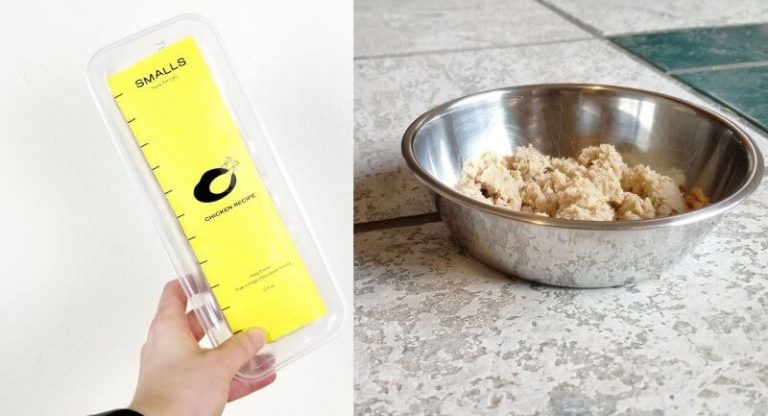
Product Info
- Brand: Smalls
- Food Form: Kibble, Fresh
- Benefits: Good for cats with allergies and food sensitivities
- Price Range: $1.00 - $3.50 per day, per cat
- High in moisture for digestion and hydration
- Free from grains and fillers
- Low carbohydrate content (estimated under 2%)
- Doesn’t come proportioned in daily meals
- Some cats may be sensitive to chicken ingredients
Choose from a variety of wet food formulas including minced foods and pates, made with real animal proteins like chicken, turkey, and beef. Smalls also offers a selection of freeze-dried food and treats, all of which can be delivered right to your door in convenient monthly shipments.
If you’re looking for a nutritious, highly digestible cat food made with ingredients you can feel good about, Smalls is a brand worth considering.
Hill’s Science Diet Cat Food
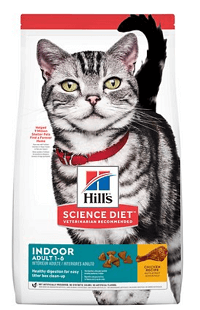
Product Info
- Brand: Hill’s
- Product Line: Science Diet
- Benefits: Hairballs, sensitive stomach, urinary care, etc.
- Price Range: $2 - $3.50 per pound
- Formulated to address common concerns
- No prescription needed for purchase
- Complete and balanced nutrition
- Somewhat more expensive than regular cat food
- Contains corn and wheat ingredients (some cats are sensitive)
Open Farm Wild-Caught Salmon Rustic Blend
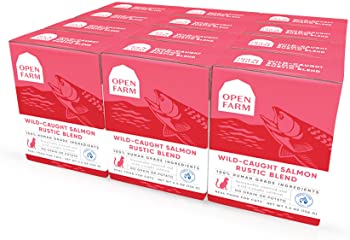
Product Info
- Protein: 8% Min
- Fat: 4% Min
- Fiber: 2% Max
- Moisture: 82% Max
- Caloric Content: 805 kcal/kg or 135 kcal/156 g carton
- Food Type: Fresh
- According to Open Farm, this food is made from real wild-caught salmon
- No fillers, animal by-products, or vaguely named ingredients
- High in protein and moisture content
- Expensive compared to most commercial diets
Open Farm is a great option for fresh cat food and for shedding because it is made from wholesome, natural ingredients including premium animal proteins and fresh vegetables.
This Open Farm Wild-Caught Salmon Rustic Blend features fresh wild-caught salmon as the top ingredient with real vegetables for carbohydrate energy, fiber, and essential nutrients.
Because fish is the main ingredient, this recipe is naturally rich in omega-3 fatty acids which is essential for skin and coat support, helping to reduce your cat’s excessive shedding.
Royal Canin Veterinary Diet Cat Food
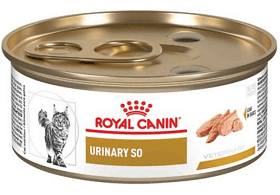
Product Info
- Brand: Royal Canin
- Product Line: Veterinary Diet
- Benefits: Urinary, renal, digestion, etc.
- Price Range: $3 - $4 per pound
- Recipes formulated for specific concerns
- Available in wet and dry food options
- Complete and balanced nutrition
- Requires a prescription to purchase
- Significantly more expensive than typical cat food
Purina Pro Plan Veterinary Diets
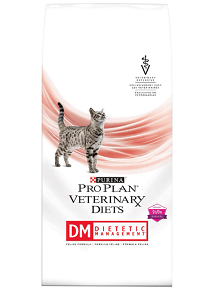
Product Info
- Brand: Purina
- Product Line: Pro Plan Veterinary Diet
- Benefits: Digestion, urinary, joints, etc.
- Price Range: $3 to $6 per pound
- Varied line of food products and supplements
- Formulated to address specific concerns
- Recipes are AAFCO approved for nutrition
- Significantly more expensive than most kibble
- Some products require a prescription to purchase
Hill’s Prescription Diet Cat Food
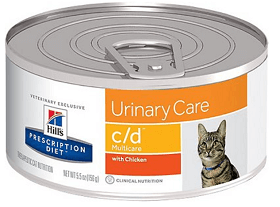
Product Info
- Brand: Hill’s
- Product Line: Prescription Diet
- Benefits: Urinary, kidney, digestive, etc.
- Price Range: $3 to $6 per pound
- Formulated to address various veterinary concerns
- Available in wet food and dry food recipes
- Vet-approved and AAFCO-approved
- Products require a veterinary prescription to purchase
- Significantly more expensive than most kibble
Iams Proactive Health Cat Food
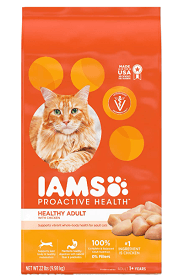
Product Info
- Brand: Iams
- Product Line: Proactive Health
- Benefits: Indoor health, hairballs, weight control, etc.
- Price Range: Under $2 per pound
- No prescription required for purchase
- Formulated to address health concerns
- Complete and balanced by AAFCO
- Only available in dry food recipes at this time
- Some byproducts used in the ingredients
Tips For Feeding Your Cat A Healthy Diet
Before buying a bag of cat food, make sure it carries the AAFCO statement of nutritional adequacy – this means that it is complete and balanced for use as a daily diet. From there, you can choose the brand, formula, and main ingredients in your cat’s food. Keeping your cat’s preferences in mind, choose a recipe that is rich in protein with moderate fat and minimal carbohydrates.
Here Are Some Simple Tips For Feeding Your Cat A Healthy Diet:
- Choose a cat food formulated for your cat’s life stage (kitten, adult, or senior) to make sure it is properly balanced.
- Look for whole-food ingredients like real meat, fresh vegetables, and healthy fats.
- Check the feeding recommendations on the package to determine how much to feed your cat according to its age and weight.
- Try not to alter your cat’s diet too often – frequent or sudden changes can lead to digestive upset.
- Limit the number of treats you give your cat on a daily basis – treats should only make up about 10% of your cat’s daily diet.
All cats have the same basic nutritional requirements, but each cat is unique in its preferences. Once you choose a cat food for your cat, take the time to transition it slowly onto the new food to avoid upsetting its digestive system.
Should You Mix Wet and Dry Cat Food?
Dry cat food is typically more affordable than wet food when it comes to your cat’s staple diet and it also provides dental benefits to help keep its teeth clean.
On the other hand, wet food is higher in moisture which is beneficial for urinary health and it can support your cat’s metabolism and help it maintain a healthy bodyweight.
To ensure that your cat gets the benefits of both, consider feeding it a mixed diet of wet and dry food.
For general health, mix about 25% wet food with 75% dry food. If you’re concerned about your cat’s weight or its urinary health, increase the amount of wet food to 50/50 or even more to 70% wet food and 30% dry food.
For more information on The best wet cat foods on the market today, click here to read to the full guide
Another concern with feeding your cat dry food is that there is some risk for kidney problems as well as urinary tract blockage and inflammatory bowel disease.
In many cases, these problems can be avoided by boosting the moisture content of your cat’s diet. To do so, mix some wet food with your cat’s dry food or try moistening its wet food with water or broth.
Final Remarks
When you ask your veterinarian for a recommendation on what to feed your cat, take the response as that – a recommendation. Though your veterinarian may know what’s medically best for your cat, you have a deeper understanding of your cat’s daily needs, so it is your responsibility to choose the best food to meet those needs. A vet-recommended diet may or may not be the best choice.
If you’re still not sure where to start in looking for a vet-recommended cat food recipe, try out one of the top 7 best options we’ve reviewed above. Best of luck to you!
